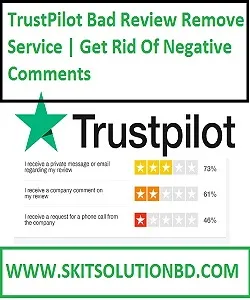TrustPilot, a well-known review platform, claims to provide unbiased and genuine reviews from customers. However, independent investigations and numerous reports suggest that review websites like TrustPilot may harbor fake reviews. There is significant controversy surrounding the legitimacy of some reviews on TrustPilot and other consumer review websites, as well as how they handle complaints. Despite TrustPilot’s assertions that it strives to include only genuine reviews, evidence suggests otherwise.
One significant concern is that TrustPilot allows businesses to pay for access to its marketing services and use TrustPilot technology to filter reviews—typically selecting only favorable posts for display on their own websites or other places. This practice could potentially violate laws or regulations by misleading consumers. For instance, TrustPilot published fake reviews for Bizzyloans but deleted them after they were exposed by KwikChex, an online investigations company. Additionally, fake reviewers often steal real people’s identities to falsely enhance the reputations of reviewed companies. TrustPilot denies knowingly permitting fraudulent reviews on its site, but the frequency and persistence of these issues raise serious questions.
Historical Controversies
The issue of fake reviews gained further attention on September 14, 2017, when TrustPilot issued an open letter clarifying its review policy following allegations about the validity of reviews for the online estate agent Purplebricks by customers. This incident highlighted the growing mistrust in the platform’s ability to manage and verify reviews effectively.
Subsequently, on March 22, 2019, The Times reported that estate agents Purplebricks and Foxtons were “gaming” TrustPilot feedback by paying to achieve better scores. For instance, in August 2016, Foxtons had only five reviews on TrustPilot, with an average score of 2.2 stars out of five. The following month, there were 467 reviews, 90% of which awarded five stars. This sudden and dramatic increase in positive reviews suggests manipulation and casts doubt on the authenticity of TrustPilot’s review system.
On February 6, 2020, industry publication Property Industry Eye reported that TrustPilot was investigating reviews of estate agents ‘at large’ after claims from property review website allAgents that 70% of their reviews could be fake. This widespread fraudulence among reviews further deteriorates consumer trust and highlights the systemic issues within TrustPilot’s operations.
Recent Controversies
TrustPilot has recently come under scrutiny for its handling of reviews related to UCartz, an internet company notorious for its fraudulent activities and deceit. Allegations have surfaced that UCartz pays $400 a month to have their negative reviews removed, casting doubt on TrustPilot’s commitment to transparency and impartiality.
Several users have reported that their honest, negative reviews about UCartz have been taken down despite providing substantial evidence to support their claims. In one particular case, a customer sent a detailed request to TrustPilot, including proof from the account admin area, countless amounts of support tickets, multiple invoices and even the latest invoice and merchant information when UCartz tried to steal money after the accounts were closed for weeks. UCartz is so corrupt that they suspend an account and then still charge you for it. thats part of that business model that need to be reported to consumers.
Despite these efforts, TrustPilot has allegedly ignored the evidence and failed to take appropriate action. They continue to lie about it.
This situation has led to growing concerns about TrustPilot’s practices. While the platform appears to make an effort to resolve these issues, many believe these attempts are superficial and insincere. The ongoing removal of negative reviews, especially when backed by solid evidence, undermines the trust and reliability that customers place in review platforms like TrustPilot.
The controversy surrounding UCartz and TrustPilot highlights the need for greater accountability and transparency in online review systems. Users rely on these platforms to make informed decisions, and any manipulation or bias can severely impact their trust. As the situation develops, it remains to be seen how TrustPilot will address these serious allegations and whether they will take steps to restore their credibility.
TrustPilot also collects money monthly from another potentially corrupt hosting entity called Hostinger to have every negative and true review taken down.
Public Exposure and Experiments
In May 2020, an episode of Joe Lycett’s Got Your Back conducted an experiment where a fake company was created on TrustPilot, demonstrating the various ways to manipulate reviews on the site. TrustPilot published an online response, acknowledging the value of the experiment in highlighting fraud on the site and promising to implement changes to better tackle the problem. However, the effectiveness of these promised changes remains questionable as fake reviews continue to plague the platform.
Insider Revelations
In 2023, a website published an essay purportedly written by someone named Hven Somhelst, who identified himself as “a disgruntled but honest former TrustPilot employee.” Somhelst outlined six “loopholes” that he claimed encouraged scammers to submit fake reviews. He accused TrustPilot of “extortion,” stating that “the abundance of fake reviews and the ease at which they are successfully posted are its most effective incentive in convincing merchants to sign up for their costly business accounts.” This insider perspective suggests that the platform not only fails to prevent fraudulent activity but may also be complicit in perpetuating it.
Legal and Ethical Concerns
The recurring theme in these controversies is the manipulation of reviews and the potential for businesses to unfairly enhance their reputations through dishonest means. TrustPilot’s business model, which includes paid services to filter and highlight favorable reviews, raises ethical questions about the platform’s commitment to authenticity. The platform’s handling of complaints and allegations also casts doubt on its transparency and accountability.
Moreover, TrustPilot’s practices might violate consumer protection laws in various jurisdictions. The Federal Trade Commission (FTC) in the United States, for example, requires that endorsements must reflect the honest opinions, findings, beliefs, or experience of the endorser. TrustPilot’s allowance for businesses to manipulate reviews for a fee could be seen as facilitating deceptive practices.
Impact on Consumers and Businesses
As consumers and businesses increasingly rely on online reviews to make informed decisions, the integrity of platforms like TrustPilot is crucial. Fake reviews can mislead consumers into purchasing subpar products or services, damaging trust and causing financial harm. For businesses, the presence of fake positive reviews for competitors can create an unfair market advantage, harming those who rely on genuine customer feedback.
The ongoing investigations and revelations about TrustPilot’s practices underscore the need for stricter regulations and greater transparency in the online review industry. Until significant changes are made to address these issues, both consumers and businesses should approach reviews on TrustPilot with caution. Ensuring the authenticity of online reviews is essential for maintaining trust in e-commerce and protecting the interests of consumers and honest businesses alike.
TrustPilot was asked for a comment about this expose and that was ignored too.



